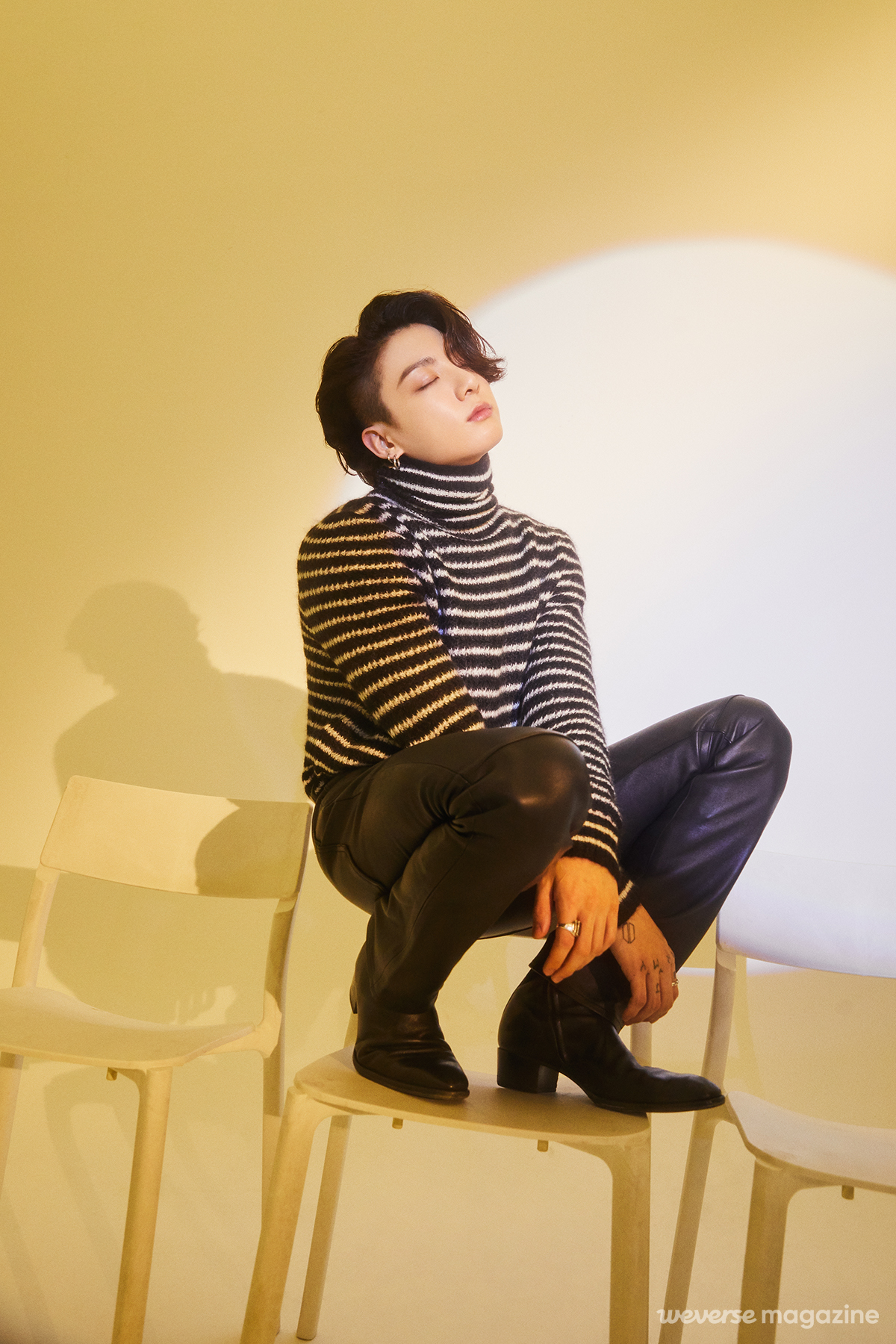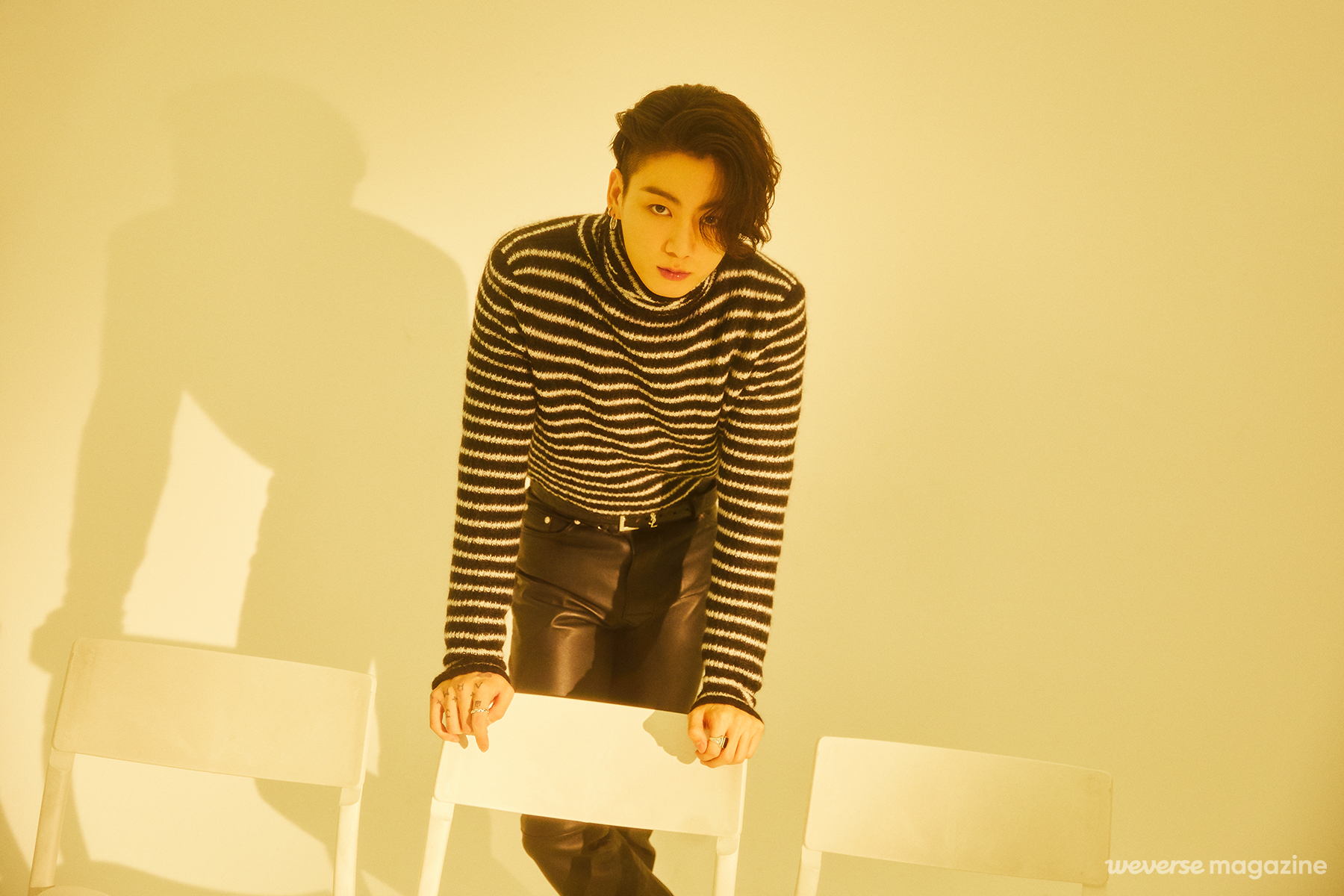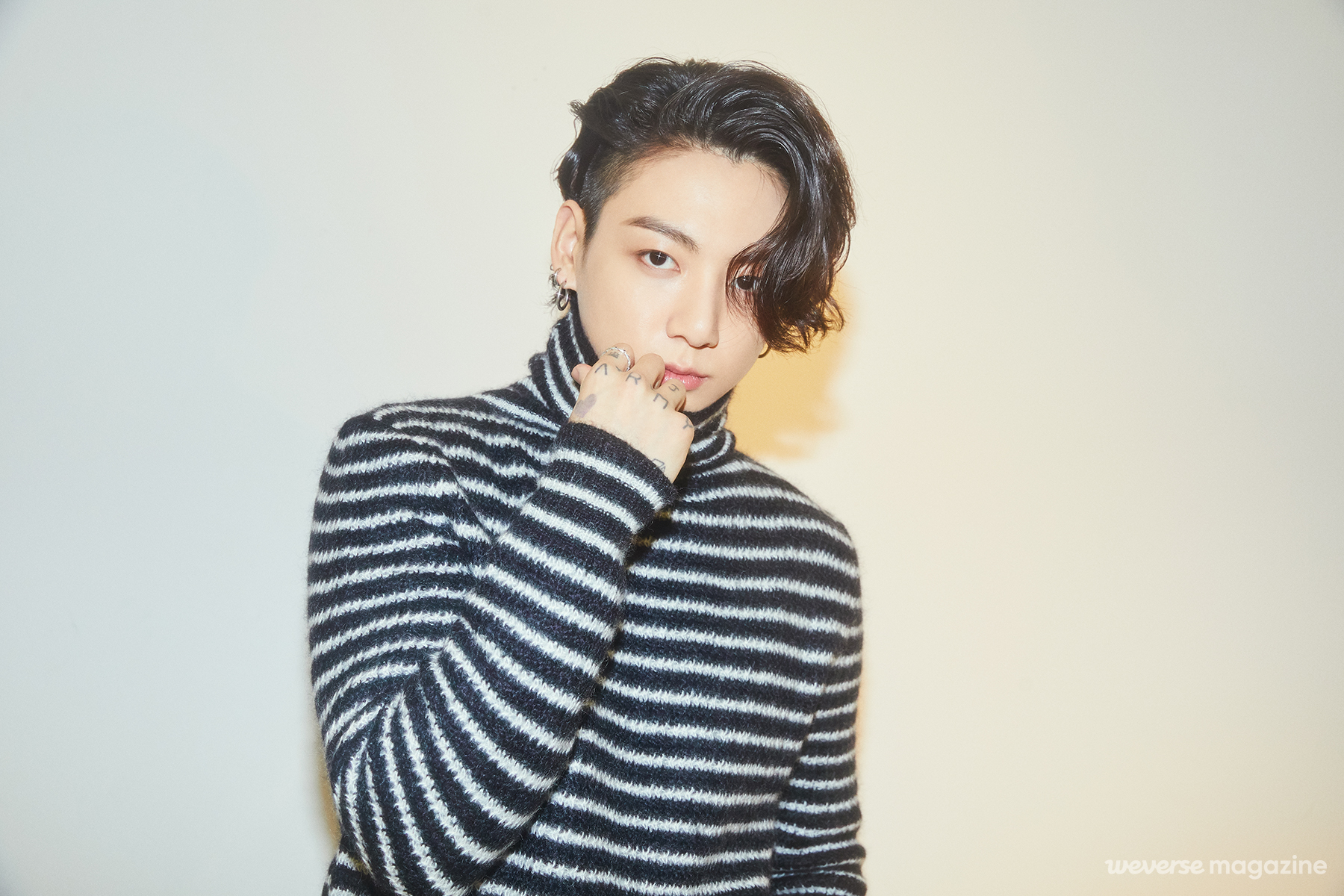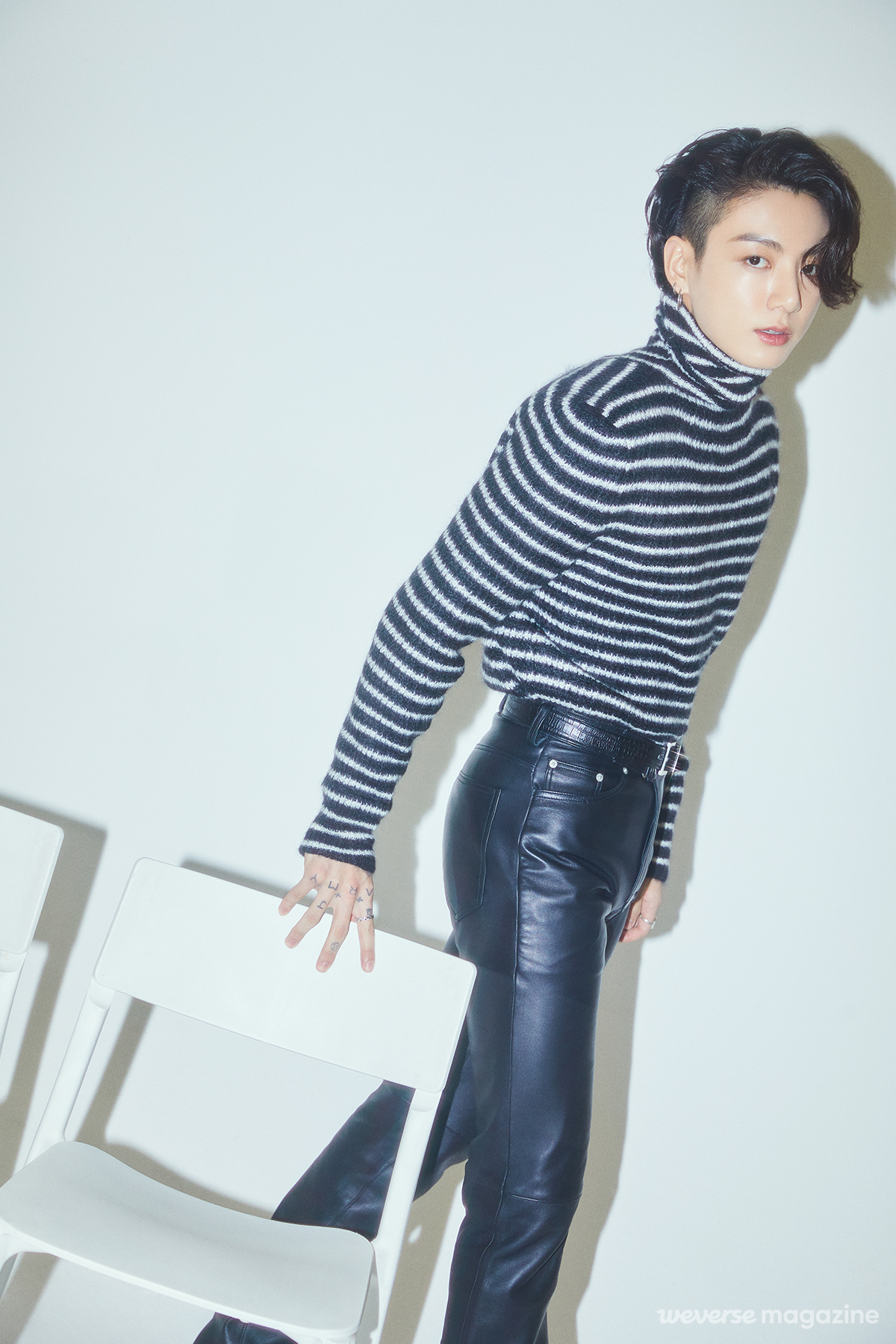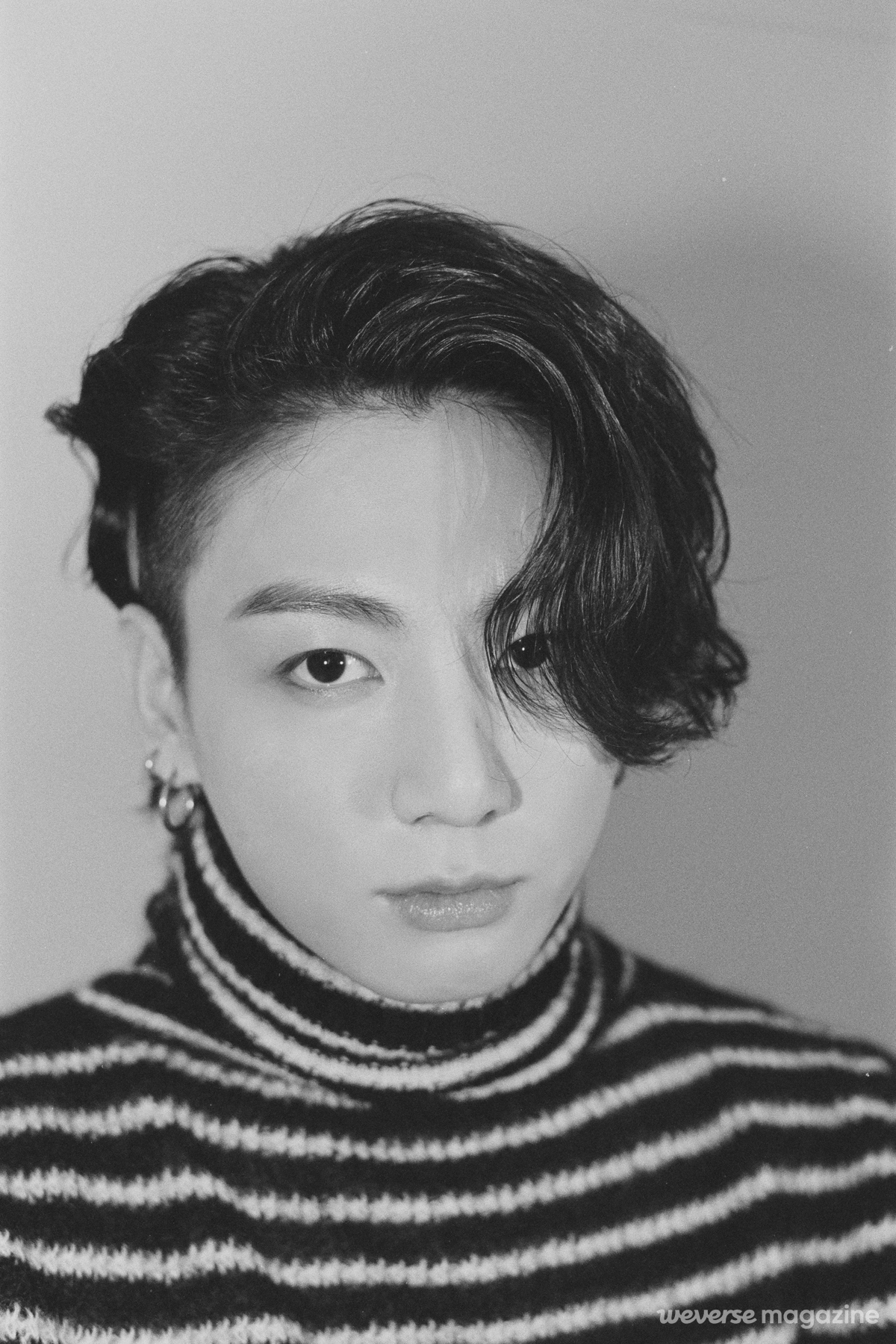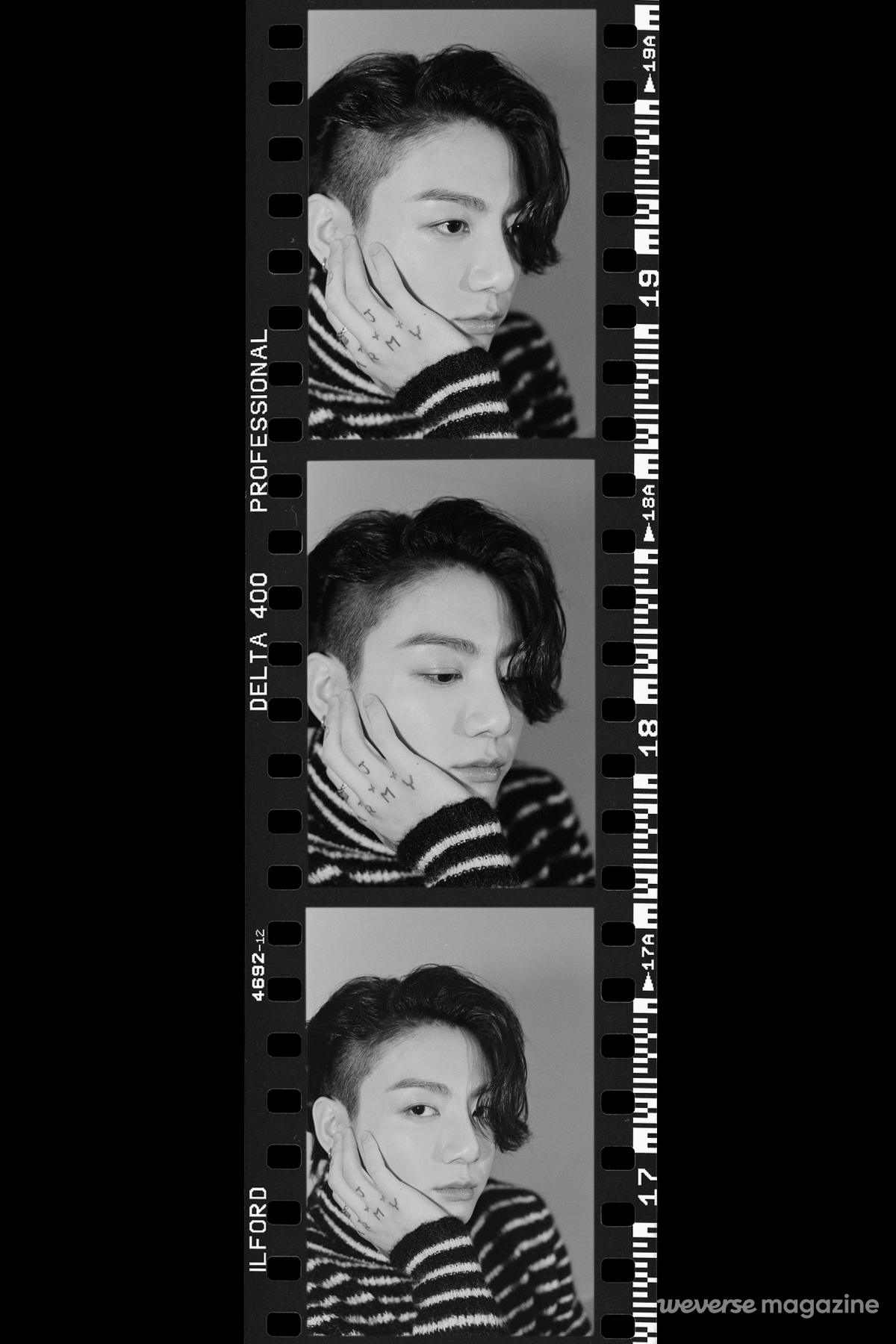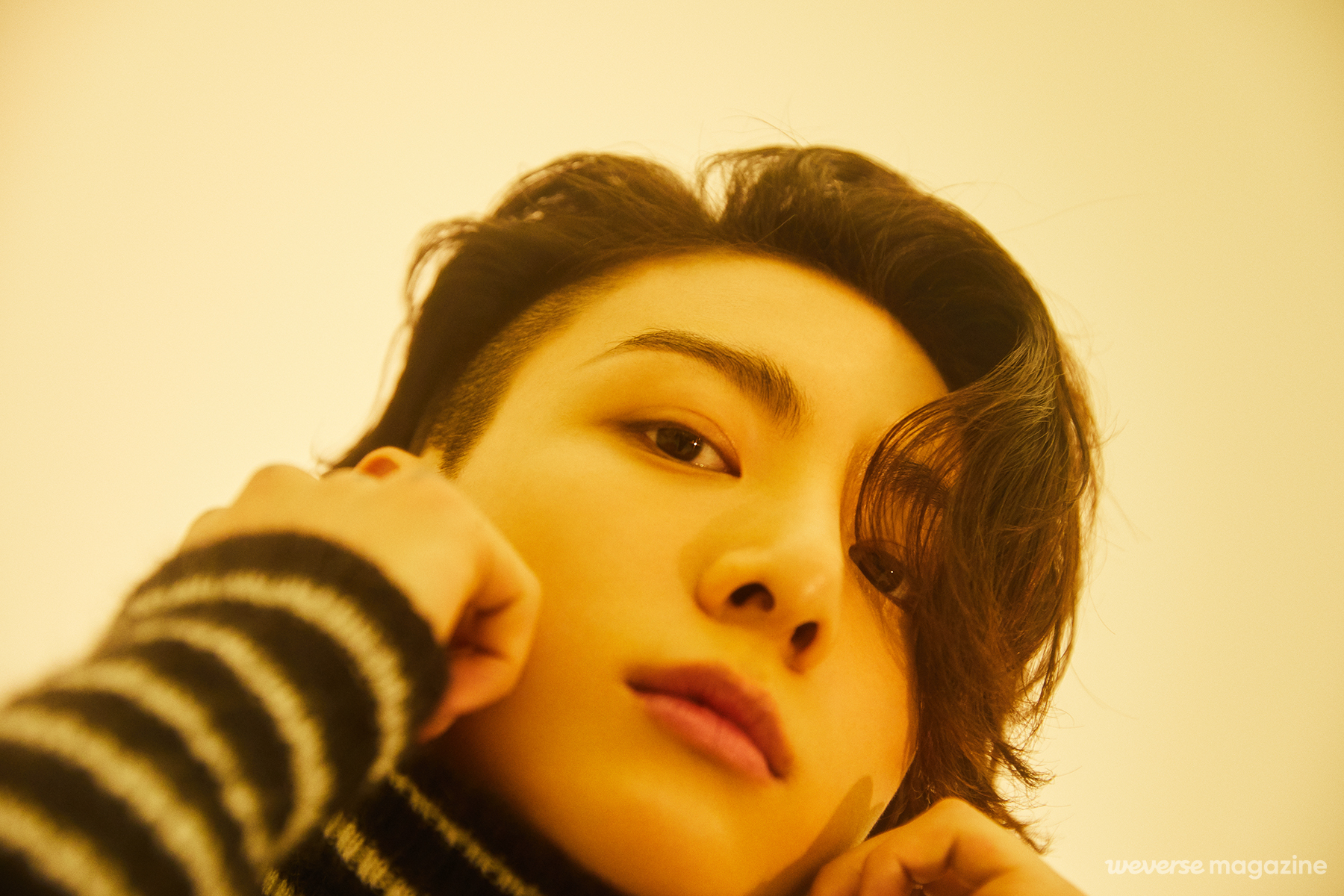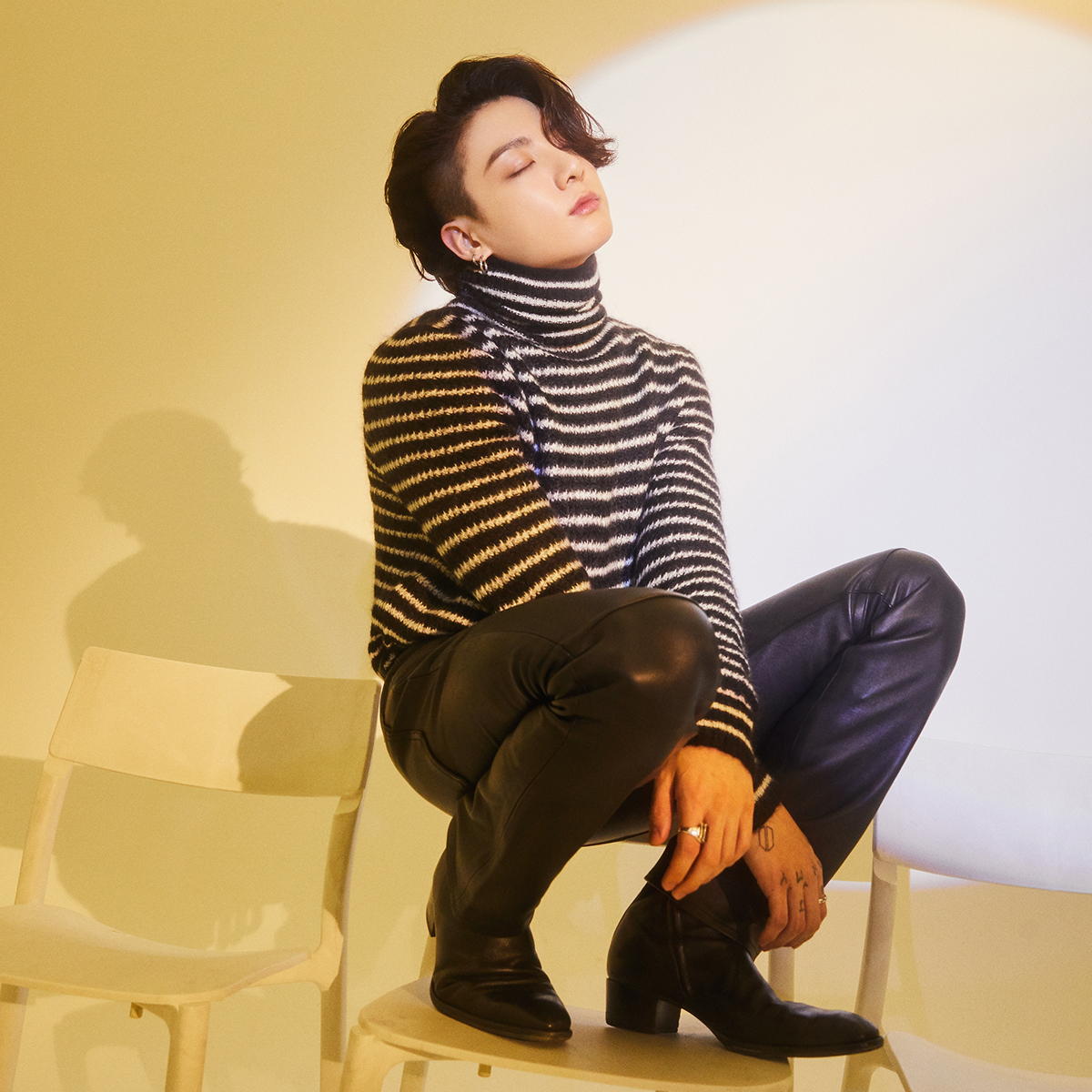
You directed the music video for “Life Goes On,” BE’s title song.
Jung Kook: I was really eager to direct the music video from the outset. My plan was to organize the synopsis, discuss it with the music video director I was working with, shoot and edit them, but we were short on time. So I worked on it while sharing ideas with the director. Originally there were a lot of scenes with lip synching in them, but we took some of them out and put in more scenes that conveyed the members’ emotions better. It wasn’t easy to combine scenes, but I think now I know more about how much of everything is needed when shooting a music video.
You had shot the Golden Closet Films and uploaded them to the BTS YouTube channel, and now you shot a music video.
Jung Kook: Once we were on location, we had directions for everything we needed to shoot prepared in advance, so I took candid shots of the members here and there with a camera during the shoot. We were filming in a beautiful place so when they asked me to take pictures of them as they wanted to be presented, I did.
What kind of pictures did you take of yourself?
Jung Kook: I was just, in them. (laughs) I’m not in the shot for the Golden Closet Films either. I kind of take a back seat. The director had to shoot my parts for the music video, since I couldn’t film myself, so I relaxed a bit. I tried to make the other members look really good when I recorded them. Since this was a BTS music video and not my own, I wanted to show what was happening with every member and the team, not just one individual’s thoughts. Each person who watches the video might feel different, but I wanted to show that we feel what other people feel, that we’re in the same situation.
You get your picture taken a lot, but you don’t pay much attention to the ones you’re in.
Jung Kook: I never really liked having my picture taken. (laughs) And I’m usually with the others when we’re working, obviously, but it’s hard to take a camera and take selfies. So I take pictures and videos of the other members every chance I get.
Jung Kook: I put my best face forward when it’s for something I have to do, like for photo books, but it’s still not easy. Videos are okay, though. And even though I’m not nervous at all when I sing in front of tens of thousands of people, if I have to sing or talk in front of a small group, I get super nervous. I never feel that way on stage, but maybe I have a hard time doing things that are a little bit awkward for me.
It seems like you draw a distinction between work you enjoy and work you find difficult.
Jung Kook: Work related to music, like recording, composing, writing lyrics, filming music videos and things like that, are all fine. But anything outside of that is probably a challenge for me.
On BE, you each explained your feelings about work in the song “Dis-ease.” You must have experienced a cycle of enjoyable and difficult work over seven years, so how did you get through the hard times?
Jung Kook: I actually understand my own problems well, so most of the time it’s okay. I can figure things out one at a time through experience instead of just looking for answers. I’m always growing and my personality changes, depending on my environment. I think I’ve learned to do things I used to find difficult by experiencing it little by little.
Jung Kook: When I was a trainee, I saw the older members rapping and thought, “Wow, they’re so cool!” But now, after having spent everyday together, I’ve forgotten about all that. (laughs) Sometimes I see the lyrics they wrote, see them dancing and hearing the things they say on stage, and think, “Oh, right. That is the kind of person they are. They’re a lot different now.” You know how you don’t feel it when you live with your family, but if you can’t see them for a long time, you miss them. You might even cry. We’re a real family. Like, legit! (laughs)
Your “legit family” (laughs) each put their own songs on BE and came up with units spontaneously. What was it like making the album that way?
Jung Kook: We talked with the company over the outline of the album and organized our ideas together. That was our process for making songs. Then we’d listen to them together, and if we thought they weren’t great, we’d go back and work on them some more. The members would get together and say, “Hey, how about so and so do a unit song this time?” or, “What should it be about?” and share a lot of ideas that way.
How did the others respond to your song, “Stay”?
Jung Kook: That song was originally meant to be on my mixtape. We planned to put a different song on the album, but after V heard it, he said, “This song that Jung Kook wrote is really good,” and then the other members all listened, said it was better than the other one, and somehow (laughs) “Stay” made it into the album. The message for the other song was also, “Even though we’re far apart, stay just where you are.” I wrote my song with the same theme so I loved that it was included in BE. At first, I wanted to talk about how we’re always together, using the English word “wherever.” I wanted to express how we’re always together no matter where we are, but Namjoon heard that and said “Stay” might be better. I liked his suggestion, so I changed it. He really helped me to organize my thoughts, since I’m not always good at writing everything I want to express.
One might go as far as to say the lyrics sound heartbreaking, but it’s arranged in EDM.
Jung Kook: We imagined we were performing for the fans while we made it, jumping up and down with them.
Jung Kook: This album really hit us in a different way, with this situation being what it is. Because the world is struggling with COVID-19, we have to keep our heads up and convey our messages to our fans.
What can your fans expect from you when you finally meet again?
Jung Kook: There’s nothing specific, but when I watched our old performances, my facial expressions were awkward and my dance moves weren’t always perfect. I keep working to improve myself, so I hope when the fans see me, they think my performance is amazing and that my aura fills the stage.
Are you happy with how you look in your latest work?
Jung Kook: I’m not 100% satisfied, no. When we did performances for “Dynamite” recently I kept seeing my imperfections.
Your acting in the intro to your “Dynamite” performance was really impressive. Even in COVID-19 times, you captured a feeling of liveliness and being cool, as though to explain what the song is all about.
Jung Kook: Actually, on the first day of filming the music video, I was supposed to film my parts first, but I was so bad that it had to be pushed to the end of the shoot. So,I was a bit more relaxed when the camera rolled.
So that’s what you get when you’re relaxed! (laughs)
Jung Kook: Yes, I relaxed, and something went “pop!” and “boom!” inside me, and then I did it however I wanted. (laughs)
Jung Kook: I can be a shy person. When people used to ask me to sing, I couldn’t always do it—like in front of adults or teachers. And I’m still a bit like that. If I start thinking, “Oh, I can’t do this,” then I really end up not being able to do it. Even when I could have done well.
Why do you think that is?
Jung Kook: I feel the same way about my dancing and my singing, and I can’t compose a really amazing melody either. I feel like I’m always somewhere in the middle. But then I also think I have my own colors, so I like to quietly, slowly open up to people, and let them know what kind of person I am. Yeah, something like that. (laughs)
But, when you review your songs and performances objectively, you see all of your changes, don’t you?
Jung Kook: There’s a lot of change. My voice has changed a lot; I grew taller and my frame and facial structure have changed, too. I could tell how awkward I looked at the beginning, but after a while, I think, “My gestures look better now, but I feel like my dance is too rigid.” And again after a while, “Now my dance is fine and my gestures are good, but I’m making awkward facial expressions.” And later, I say, “Now I got the facial expressions down, but, hmm, there’s no killer move.” (laughs) That’s how I slowly changed. And then my actions, thoughts, dreams, goals, what I value, what I want to do—all these things will change depending on the situation.
You had some changes in BE, too. Throughout “Life Goes On,” you lightly carry your voice and tone throughout the whole song, like they’re flowing.
Jung Kook: Right. I think that’s very important. My general feeling was my voice should be woven into the song, rather than bringing out my individual voice. The lyrics say the world stopped, but I can’t keep on being sad, and life continues and flows on. I wanted to mix a little bit of my own colors into that complex, subtle sadness. I listened to how the other members recorded their parts for the song, and I sang while thinking about how I could do it in a way that it would all blend together well. I kept changing my voice exploring how to make it sound better, cleaner. I kept trying new things while I was recording, performing, and practicing.
When you look back after all that change, don’t you feel like you accomplished a lot?
Jung Kook: I don’t really pay attention to things that have already happened. I think more about what it is I need right now, so I rarely think, “I got a lot better from how I used to be,” or, “I did a good job.”
Jung Kook: Yes. This is how I want to keep living, and I hope this feeling never fades.
You’ve found immense success with BTS. What makes you want to keep doing more and keep improving yourself?
Jung Kook: I want to show people who I am: how I talk, how I act, how I sing, and so on. And after that, I want to be acknowledged for doing what I like to do, and for people to see what an amazing guy I am. I want to do these things step by step. I want to be appreciated as Jung Kook, as the real me.
What do you think is the source of that energy—the energy to keep proving yourself, even though you’ve already achieved so much with BTS?
Jung Kook: I think my heart’s telling me to. BTS was able to climb this high thanks to the group members, the company and our fans. But there’s always the question of whether I could receive that kind of recognition by myself, so I have this feeling of wanting to throw myself at some challenge alone. There’s a lot I want to do, and a lot I want to achieve.
By gradually improving yourself, what kind of person would you ideally want to become?
Jung Kook: A person who’s crazy awesome in their field. (laughs) Those kinds of people look cool even when they do something different. I still have a long way to go. I feel like I could be more captivating and draw more out of people by improving any number of things, by trying hard to be confident about my singing, or the way I dance and perform. BTS is way more important and meaningful to me than I am to myself, so I’m not saying I want to do anything alone. But I hope I get to the point where I can perform alone for three or four hours in a venue full of people.
It’s clear that your job, music, is very important to you.
Jung Kook: I must never let it go. That’s what I always think. I have to keep it close to me, even if I get bored, or I don’t want to hear it, or it feels like a hassle. I want to keep on making music. It may be a long ways down the road, but I want to prove myself with my music.
You said before that your MBTI is ISFP, so I looked it up. Obviously, MBTI can’t sum up a person perfectly, but it says ISFPs tend to be “curious artists.” Your answer reminds me of that.
Jung Kook: That sounds about right. I looked up the personality traits for ISFP too, and it was interesting. (laughs)
Maybe that’s the reason you set your goals so high. You seem like you have high standards and want to keep growing.
Jung Kook: It’s like a foggy mountain top. (laughs) I can’t even see it yet.
Jung Kook: Umm … Well, there are seven of us, and the seven of us keep running ahead. So it’s possible we could get tired, one by one, and drop out, right? But if more people join us, one by one, and run with us, we can support each other and pull each other up if someone falls down. That’s kind of how I feel. There are people who supported us from the beginning who have been watching us the whole time since, and because of them our follower count keeps going up, and they all keep us on track. So the only thing I can say is—thank you. We were nothing special, really (laughs) but they keep on liking us and supporting us, and the best way we can repay them is to give them our all through our music and our performances. They push me to work hard, even on things I find difficult. (laughs) I’m eternally grateful.
Just like in the last line of “Stay.”
Jung Kook: “We are together.”
Unauthorized reproduction and distribution prohibited.
